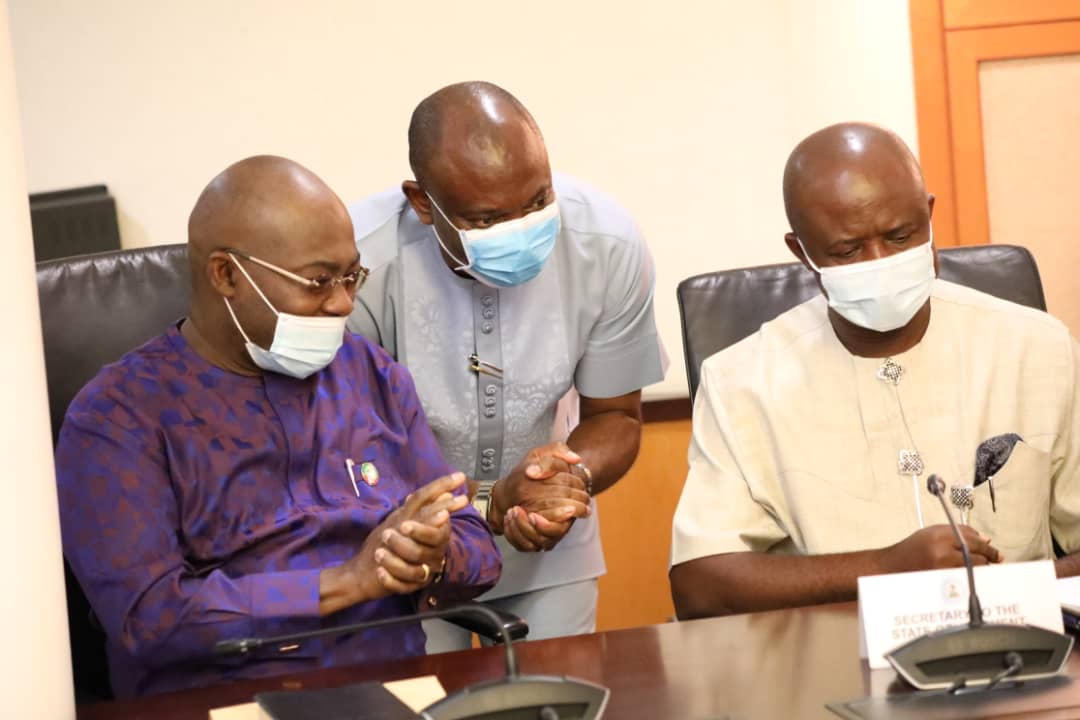News
‘Enemies Of State Attacking Security Personnel, Infrastructure’

The Civil Society Legislative Advocacy Centre (CISLAC) has condemned in strong terms multiple attacks on security agencies, installations and infrastructure in recent weeks, describing those behind the attacks as enemies of the state.
In a statement by Executive Director, CISLAC and Head Transparency International in Nigeria, Auwal Ibrahim Musa Rafsanjani, while condoling security agencies who have lost their personnel, particularly those attacked by anonymous gunmen and those combating crime across the country, the pattern of organised criminal violence suggests that they are undertaken by forces who are bent on pushing the country off a cliff.
Rafsanjani called for proper responses from law enforcement to ensure the security of lives and properties, stating:
“This is a statutorily imposed duty on law enforcement agents, and a right guaranteed to the citizens of Nigeria. Surveillance and intelligence gathering are some of the sophisticated methods that law enforcement authorities use to tackle security challenges. These help them gather information enough to prevent any crime.
“Civil Society Legislative Advocacy Centre stands with the entire security agencies across the country and expresses deep sadness over those whose lives have suffered fatalities in the line of duty. When government project is vandalised, those doing so are enemies of the people because when you incarcerate someone in prison, normally the due process would have been followed. This is in public’s interest and therefore, for anyone, to undertake the release of prisoners or burn correctional centres, otherwise known as prison, is the number one enemy of the people.
“We live in a society where almost every social problem–from noisy neighbours to chasing Bandits–has become a point of police intervention. The recent attacks are an epidemic of harassment and violence on Policing. The question is have we found other ways to solve our issues? “What if we rolled back police power, and abolished the institution entirely? We already have an infrastructural deficit. We already have poor policing ratio. We urge the people to find an alternative to these attacks. Our security agencies need more resources to ensure that we are all protected.
“All over the world, law enforcement violence and corruption have reignited massive movements that seek police reforms. Nigeria is no different. In recent weeks, Nigeria has experienced rising levels of gunmen attacks nationwide. For instance, on the 19th of April 2021, multiple gun violence was recorded across several states.
“The trend affirms the report of small arms and light weapons (SALWs) proliferation and the continued de-monopolisation of the instrument of violence from the hands of the state. Non-state armed groups’ menace has worsened in the face of overwhelmed security operatives and porous border challenges. New vistas of violence have also emerged to exacerbate the security crisis.
“For instance, unknown gunmen have continuously attacked security posts in the southeast and south- south zones, freeing detained suspects, razing security infrastructures, and killing police officers. The biggest challenge of this trend is that the gunmen are still largely unknown; their string of attacks is unending. In the latest incident, gunmen on Wednesday attacked a police station in Enugu, killed two police officers and burned down the station”.
CISLAC called out the absence of legislation to check proliferation of Small Arms and Light Weapons (SALW) despite the fact that 70% of the 8 million weapons find their way into the country.
“Available data on Small Arms and Light Weapons (SALW) show that out of the 640 million circulating globally, it is estimated that 100 million are found in Africa, about 30 million in sub- Saharan Africa and eight million in West Africa. 70% of the 8million find their ways into Nigeria. The majority of these SALW about 59% are in the hands of civilians, 38% are owned by government armed forces, 2.8 % by police and 0.2% by armed groups. Nigeria is rated high in the regional debate for the control of small arms and light weapons and illegal trade. Yet the country lacks a legislative direction in dealing with such menace,’ Rafsanjani said.
“This concern was recently highlighted by the former head of State, Gen. Abdulsalam Abubakar. Tiptoeing into these massive attacks and looting armouries is a danger that is waiting to happen until and unless we find the whole of society solution to our problems.
“The high rate accumulation of SALWs in Nigeria is a product of the interplay of several interrelated factors. In the first place, there is a general lack of transparency around the arms trade. Nigeria considers its arms policy to be secret, which makes it hard to access. Similarly, arms dealers promote corruption by involving some countries in illegal activity. Insecurity in Nigeria also makes it easy for small arms to enter illicit circulation through theft, leakage or re-sale.
“Secondly, SALWs by virtue of their several characteristics make them very attractive to paramilitary and irregular forces and even untrained civilians thereby aiding in their proliferation.
“Nigerian security agencies must improve their intelligence-gathering capabilities. Nigerian police force must rise to the occasion and stop the attacks on its personnel and infrastructure. The continued raids on police stations and apparent anonymity of the gunmen is a test of the efficacy of Nigeria’s security intelligence and ability to tackle criminality. Continued attacks on police posts prove their vulnerability and, even more, the vulnerability of hapless Nigerians in the face of growing gunmen terror. Through intelligence gathering, fortified security posts, and multi-security framework, Nigeria’s security agencies must now save themselves to secure the nation”.
Suggesting a way forward from the security challenges, Rafsanjani said, “There is need for concerted and collective efforts among stakeholders at all levels of the society to curtail illicit SALWs proliferation. Hence, capacities of stakeholders should be enhanced for an effective implementation of result-oriented programs and formulation of evidence-based policies;
“There is a need for interventions at the national, state and local levels to be strengthened and promote peaceful coexistence amongst the diverse ethno-religious and political groups in Nigeria.
“There is need for an improved border management mechanism using modern and sophisticated detection equipment to discourage arms trafficking through the borders. Also, effective strategies should be deployed to numerous police forces/stations.
“There is need for a review of the Fire Arms Act with stringent penalties to address the current challenges associated with SALWs proliferation. The three arms of government and all stakeholders should make and implement laws pertaining to the manufacture, importation, storage and possessions of firearms;
“There is need to establish and strengthen institutional frameworks for the control of elicit SALWs proliferation to ensure an effective, coordinated and consistent implementation of arms control programs in the country”.
News
Shettima In Ethiopia For State Visit

Vice President Kashim Shettima has arrived in Addis Ababa, Ethiopia, for an official State visit at the invitation of the Prime Minister, Dr. Abiy Ahmed.
Upon arrival yesterday, Shettima was received at the airport by the Minister of Foreign Affairs of Ethiopia, Dr. Gedion Timothewos, and other members of the Ethiopian and Nigerian diplomatic corps.
Senior Special Assistant to the Vice President on Media and Communication, Stanley Nkwocha, revealed this in a statement he signed yesterday, titled: “VP Shettima arrives in Ethiopia for official state visit.”
During the visit, Vice President Shettima will participate in the official launch of Ethiopia’s Green Legacy Programme, a flagship environmental initiative.
The programme designed to combat deforestation, enhance biodiversity, and mitigate the adverse effects of climate change targets the planting of 20 billion tree seedlings over a four-year period.
In line with strengthening bilateral ties in agriculture and industrial development, the Vice President will also embark on a strategic tour of key industrial zones and integrated agricultural facilities across selected regions of Ethiopia.
News
RSG Tasks Farmers On N4bn Agric Loan ….As RAAMP Takes Sensitization Campaign To Four LGs In Rivers

The Rivers State Government has called on the people of the state especially farmers to access the ?4billion agricultural loans made available by the State and domiciled in the Bank of Industry.
This is as the State Project Implementation Unit (SPIU) of Rural Access and Agricultural Marketing Project (RAAMP), a World Bank project, took its sensitization campaign to Opobo/Nkoro, Andoni, Port Harcourt City and Obio/Akpor local government areas.
The campaign was aimed at enlightening community dwellers and other stakeholders in the various local government areas on the RAAMP project implementation and programme activities.
The Permanent Secretary, Rivers State Ministry of Agriculture, Mr Maurice Ogolo, said this at Opobo town, Ngo, Port Harcourt City and Rumuodumanya, headquarters of the four local government areas respectively, during the sensitization campaign.
Ogolo said apart from the ?4billion, the government has also made available fertilizers and other farm inputs to farmers in the various local government areas.
The Permanent Secretary who is the Chairman, State Steering Committee for the project, said RAAMP will construct roads that will connect farms to markets to enable farmers and fishermen sell their farms produce and fishes.
He also said rural roads would be constructed to farms and fishing settlements, and warned against any act that will lead to the cancellation of the projects in the four local government areas.
According to him, the World Bank and Federal Government which are the financiers of the programme will not condone such acts like kidnapping, marching ground and other acts inimical to the successful implementation of the projects in their respective areas.
At PHALGA, Ogolo asserted that the city will benefit in the areas of roads and bridge construction.
He noted that RAAMP was thriving in both the Federal Capital Territory, Abuja; Lagos and other states in the country, stressing that the project should also be given the seriousness it deserves in Rivers State.
Speaking at Opobo town, the headquarters of Opobo/Nkoro Local Government Area, the project coordinator, RAAMP, Mr.Joshua Kpakol, said the programme would reduce poverty in the state.
According to him, both fishermen and farmers will maximally benefit from the programme.
At Ngo which is the headquarters of Andoni Local Government Area, Kpakol said roads will be constructed to all remote fishing settlements.
He said Rivers State is lucky to be among the states implementing the project, and stressed the need for the people to embrace it.
Meanwhile, Kpakol said at PHALGA that RAAMP is a project that will transform the lives of farmers, traders and other stakeholders in the area.
He urged the stakeholders to spread the information to their various communities.
However, some of the stakeholders at Opobo town complained about the destruction of their farms by bulls allegedly owed by traditional rulers in the area, as well as incessant stealing of their canoes at waterfronts.
At Ngo, Archbishop Elkanah Hanson, founder of El-Shaddai Church, commended the World Bank and the Federal Government for bringing the projects to Andoni.
He stressed the need for the construction of roads to fishing settlements in the area.
Also, a former Commissioner for Agriculture in the state and Okan Ama of Ekede, HRH King Gad Harry, noted that storage facilities have become necessary for a successful agricultural programme.
Harry also stressed the need for the programme to be made sustainable.
In their separate speeches, the administrators of Andoni and Opobo/Nkoro Local Government Areas, pledged their readiness to support the programme.
At Port Harcourt City, the Administrator, Dr Arthur Kalagbor, represented by the Head of Local Government Administration, Port Harcourt City, Mr Clifford Paul, said the city would support the implementation of the programme in the area.
Also, the administrator of Obio/Akpor Local Government Area, Dr Clifford Ndu Walter, represented by Mr Michael Elenwo, pledged to support the programme in his local government area.
Among dignitaries at the Obio/Akpor stakeholders engagement is the chairman, Rivers State Traditional Rulers Council and paramount ruler of Apara Kingdom, HRM Eze Chike Wodo, amongst others.
John Bibor
News
Tinubu Orders Civil Service Personnel Audit, Skill Gap Analysis

President Bola Tinubu has ordered the commencement of personnel audit and skill gap analysis across all cadres of federal civil servants.
The president gave this directive in Abuja, yesterday, while speaking at the International Civil Service Conference, reaffirming his resolve to achieve efficiency and professional service delivery in the civil service.
“I have authorized the comprehensive personnel audit and skill gap analysis across the federal civil service to deepen capacity. I urge all responsible stakeholders to prioritize timely completion of this critical exercise, to begin implementing targeted reforms, to realize the full benefit of a more agile, competent and responsive civil service,” the president announced.
Tinubu further directed all Ministries, Departments and Agencies (MDAs), to prioritise data integrity and sovereignty in national interest.
He called for the capture, protection and strategic publication of public sector data in line with the Nigeria Data Protection Act of 2023.
“We must let our data speak for us. We must publish verified data assets within Nigeria and share them internationally recognized as fruitful. This will allow global benchmarking organisation to track our progress in real time and help us strengthen our position on the world stage. This will preserve privacy and uphold data sovereignty,” Tinubu added.
President Tinubu hailed the federal civil service as the “engine” driving his Renewed Hope Agenda, and the vehicle for delivering sustainable national development.
He submitted that the roles of civil servants remain indispensable in modern governance, declaring that in the face of a fast-evolving digital and economic landscape, the civil service must remain agile, future-ready, and results-driven.
“This maiden conference is a bold step toward redefining governance in an era of rapid transformation. An innovative Civil Service ensures we meet today’s needs and overcome tomorrow’s challenges.
“It captures our collective ambition to reimagine and reposition the civil service. In today’s rapid, evolving world of technology, innovation remains critical in ensuring that the civil service is dynamic, digital” the President said.
Head of the Civil Service of the Federation, Didi Walson-Jack in her welcome address told the President that his presence and strong words of commendation at the conference has renewed the morale and mandate of public servants across the country.
Walson-Jack described Tinubu as the backbone of driving transformation in the Nigerian civil service, and noted that the takeaways from past study tours undertaken to understudy the civil service in Singapore, the UK and US under her leadership, is already yielding multiplier effects.
Walson-Jack assured Tinubu that her office, in collaboration with reform-minded stakeholders, will not relent in accelerating the implementation of the Federal Civil Service Strategy and Implementation Plan, FCSSIP 25.
She affirmed that digitalisation, performance management, and continuous learning remain key pillars in strengthening accountability, transparency, and service delivery across MDAs.
Walson-Jack reaffirmed that the civil service is determined to exceed expectations by embedding a culture of innovation, ethical leadership, and citizen-centred governance in the heart of public administration.
-
Business5 days ago
NSC, Police Boost Partnership On Port Enforcement
-
Politics5 days ago
10 NWC Members Oppose Damagum Over National Secretary’s Reinstatement
-
Business5 days ago
ANLCA Chieftain Emerges FELCBA’s VP
-

 News5 days ago
News5 days agoRSG Tasks Farmers On N4bn Agric Loan ….As RAAMP Takes Sensitization Campaign To Four LGs In Rivers
-

 Features5 days ago
Features5 days agoBetween EFCC And NDDC: Strategic Alliance For Niger Delta
-

 Politics5 days ago
Politics5 days agoMakinde Renames Polytechnic After Late Ex-Gov
-

 Niger Delta5 days ago
Niger Delta5 days agoOBALGA Sole Administrator Presents Brand New Fire Extinguishers To Council …Commiserates With Traders Over Rumuomasi Market Fire Incident …Commences Desilting Of Drainages
-

 Featured5 days ago
Featured5 days agoTinubu Signs Four Tax Reform Bills Into Law …Says Nigeria Open For Business

